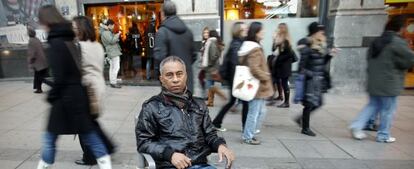“This law is my death sentence”
Cuban immigrant Julio Basilio González relies on informal help to attend his multiple health problems He was denied healthcare because of his lack of residency papers

The list of illnesses he suffers from is a long one. Julio Basilio González, a 59-year-old Cuban who has lived in Madrid since 2009, places his medical history on the table: a wad of sheets including records on his heart condition, his high cholesterol and the chronic migraines he suffers from. What worries him most is that he is unable to keep an eye on his blood pressure. “If I don’t take certain pills something can happen to me,” he says, taking a sip on his tea. “A coffee would be very bad for me.”
Until September his local doctor prescribed him the medication he requires. But his public health card expired and he cannot renew it: under a government reform set in motion on August 31, immigrants without papers are not entitled to medical care. González’s name was wiped from the system. “This law is my death sentence.”
“It’s a question of human rights; with or without papers we are human beings,” he says. In Cuba González was an orchestra director in Varadero, the tourist area of the island. In 2008 he emigrated to Holland with his Dutch wife but the marriage split up the following year. He decided to come to Spain “because it was a dream of mine and I speak the language.”
When his residency permit expired he couldn’t get a job so he spent the last of his savings on a guitar. “It’s a branded one but it was fairly cheap.” Now it is his livelihood. But the seven or eight euros he makes playing Cuban music in the street. “And people are leaving less and less, what with things the way they are.”
His subsidized prescriptions cost him about 40 to 50 euros a month. But González suspects this will amount will now “rise considerably” under the copayment system, and his reserves of pills are running low.
González’s doctor continues to see him — as do many other conscientious objectors — even though his records have been removed from the system. There is no Julio Basilio González with a heart condition in the database. But the illness exists, as do the others in his voluminous pile of records.
He makes appointments by telephone, advised to do so by Médicos del Mundo, because the online system asks for a health card number. Sometimes the doctor just writes the next appointment date and time on a scrap of paper. “As I can’t afford them all, I have to prioritize which ones I take.”
González says he no longer fears being deported for making a public complaint about his situation. “Up until a year ago the police would arrest me every week, but they never deported me. They just gave me fines I couldn’t pay.”
González doesn’t understand why, after living in Spain for four years, registered on the municipal rolls and with access to the health system, he no longer has the right “to anything at all.”
“To get residency papers they ask to see a contract, but without residency you can’t get a job. It’s humiliating. I don’t know if I’m mad or the people who make the laws are.”
González’s case is not an isolated one. Médicos del Mundo has filed a complaint that nine regions — the Balearics and Canaries, Cantabria, Castilla-La Mancha, Extremadura, La Rioja, Madrid, Murcia and Aragón — have implemented the regulation without palliatives. Some have even gone beyond what is laid out in Royal Decree 16/2012.
Ana, a 44-old-year Colombian, was diagnosed with breast cancer in 2008. After receiving chemotherapy, she underwent a mastectomy. She was given PIP implants, which were removed from the market in 2010 because they are defective. One breast was reconstructed. She was put on the waiting list for the second operation. Last Wednesday she was told that it would not be carried out at all.
“I’d heard about the new law, but I never thought they’d take me off the waiting list. They’ve left me like half a woman, with only one breast.”
Médicos del Mundo says that bringing cases like these to light is positive. The Canaries and Aragón, after initially denying claims against them, have now entered into dialogue with the NGO. In the Balearics, a patients’ association is offering help to people who have received transplants or who need insulin. A spokesman from Médicos del Mundo says the organization is grateful for these gestures, but that the NGO’s aim is to have the decree revoked.
Tu suscripción se está usando en otro dispositivo
¿Quieres añadir otro usuario a tu suscripción?
Si continúas leyendo en este dispositivo, no se podrá leer en el otro.
FlechaTu suscripción se está usando en otro dispositivo y solo puedes acceder a EL PAÍS desde un dispositivo a la vez.
Si quieres compartir tu cuenta, cambia tu suscripción a la modalidad Premium, así podrás añadir otro usuario. Cada uno accederá con su propia cuenta de email, lo que os permitirá personalizar vuestra experiencia en EL PAÍS.
¿Tienes una suscripción de empresa? Accede aquí para contratar más cuentas.
En el caso de no saber quién está usando tu cuenta, te recomendamos cambiar tu contraseña aquí.
Si decides continuar compartiendo tu cuenta, este mensaje se mostrará en tu dispositivo y en el de la otra persona que está usando tu cuenta de forma indefinida, afectando a tu experiencia de lectura. Puedes consultar aquí los términos y condiciones de la suscripción digital.









































